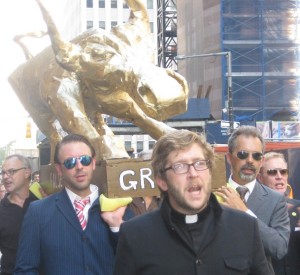With no sign of the Occupy Wall Street movement losing steam, many have been exploring the role of faith in motivating the protesters’ to take to the streets, as well as the perspective of the religious leaders who are also participating in the protests. “Protest chaplains” have joined OWS in a variety of cities, including Boston and New York. An interfaith coalition introduced a symbol – a statue of a golden calf – to carry through the protests, in a gesture that both references a scriptural touchpoint in Jewish, Christian and Muslim tradition as well as alluding to the Wall Street bull, a more modern symbol of financial aggression and prosperity. There is also a sukkah at Occupy Philadelphia, and on Yom Kippur, activists organized a Kol Nidre service.
Although, as the Wall Street Journal’s blog points out, none of New York’s big religious institutions have leapt into the fray. Rev. Michael Ellick, the minister at Judson Memorial, a New York congregation that helped organize the interfaith coalition, says that religious institutions know more about people’s economic woes than anyone else.
In a piece for the Huffington Post, the Rev. Jennifer Butler of Faith in Public Life explains what she sees as the natural connections between faith communities and the occupiers:
Scripture is replete with examples of people backsliding into sin after progressing toward righteousness. It would be foolish to believe that we are ushering in a golden age free of greed. But the occupiers are helping to end the era in which it is celebrated and rewarded with obscene wealth and power. And it’s fitting that the faith community is part of it.
The question is, what do people of faith actually think about issues of economic inequality? And are they so different from those without a formal religious identity? A look at the numbers shows that Christians, non-Christians, and the unaffiliated alike are concerned about issues of inequality, at least in theory, with some important differences:
- Majorities of all religious groups support raising the minimum wage from $7.25 to $10.00/hr, with black Protestants (85%), other Christians (74%) and the unaffiliated (73%) most strongly in support. White evangelical Protestants (58%) and white mainline Protestants (56%) are least strongly in favor.
- Only a slim majority of Republicans (51%) and less than half of people who identify with the Tea Party support raising the minimum wage (47%), compared to 82% of Democrats.
- There is a sizeable gap between white evangelical Protestants and other religious denominations on the question of whether it’s fair that wealthier Americans pay more taxes than the middle class or those less well off: white evangelicals are nearly evenly split (50% agree, 49% disagree) compared to around 7-in-10 white mainline Protestants (68%) and Catholics (70%) and 3 in 4 of the unaffiliated (76%).
These numbers show that people of faith, regardless of tradition or denomination, do support some policies (like raising the minimum wage) designed to reduce economic inequality. But they also show that while rallying around scripture could certainly be an effective tactic, the people of faith who come out to support OWS are more likely to be united by their political views than their religious convictions.
